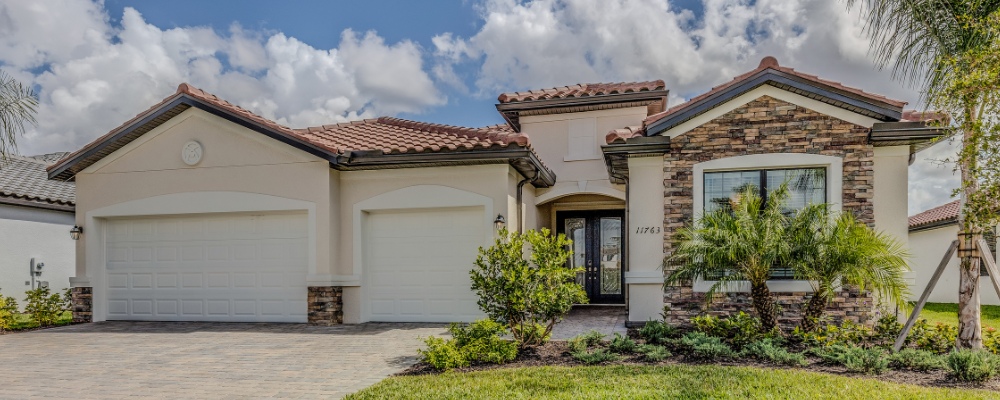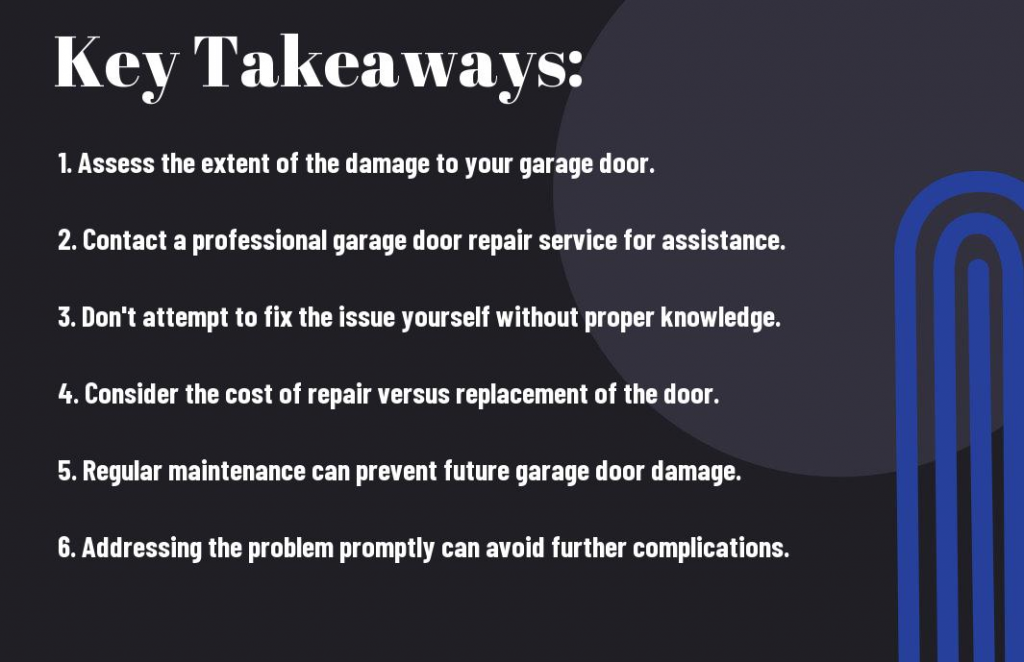Discover the intricacies of maintaining your damaged garage door optimal condition with EM Garage Doors’ comprehensive guide on the common causes of garage door damage, along with effective prevention and solutions for damaged garage doors. Our guide aims to shed light on the various factors contributing to garage door issues, offering insights into preventing damage caused by weather conditions, aging components, and tension in springs like extension and torsion springs.
We delve into practical tips for garage door maintenance, including using lubricants for spring repairs and highlighting the importance of timely repairs to avert potential safety risks, such as a broken garage door or security problems like a malfunctioning photo-eye. Trust EM Garage Doors as your go-to source for preserving the longevity and functionality of your garage door, ensuring a secure and appealing feature for your home’s curb appeal.
Understanding the Anatomy of Garage Doors
Understanding the anatomy of garage doors involves familiarizing oneself with the various components that collectively enable the door’s operation. A typical garage door comprises several integral parts, including springs like garage door springs, openers like keypads, sensors like photo eyes, hinges, panels that might require panel replacement, and rollers. Each element plays a crucial role in ensuring the door’s smooth functioning. Springs, whether extension or torsion, manage the door’s weight and facilitate movement.
Openers control the door’s opening and closing mechanisms. Sensors detect obstructions or impediments, ensuring safety during operation in LA. Hinges and panels allow flexibility and movement, while rollers assist in the smooth gliding of the door along its tracks. Recognizing and comprehending the function of these parts is fundamental in diagnosing potential issues and conducting maintenance or repairs effectively.

Common Garage Door Problems
Despite their robust construction, garage doors are not immune to issues arising over time. Some of the most common problems encountered by homeowners include:
- Malfunctioning Springs: Springs bear the weight of the garage door and assist in its smooth movement. Over time, they may become worn out or break, leading to difficulty in opening or closing the door.
- Misaligned Tracks: Garage door tracks can become misaligned for various reasons, such as accidental impact or regular wear and tear. This can result in an uneven door movement or even cause it to get stuck halfway.
- Faulty Openers: Garage door openers control the opening and closing mechanisms of the door. If they malfunction, the door may not respond to commands or operate inconsistently.
- Damaged Panels: Panels make up the exterior surface of the garage door and can be susceptible to damage from weather conditions, accidents, or regular use. Cracked or dented panels not only compromise the door’s appearance but can also impact its functionality.
- Broken Sensors: Safety sensors are installed near the bottom of the garage door and are designed to detect any obstructions in its path to prevent accidents or damage. However, these sensors can sometimes become faulty or misaligned, causing the door to stop unnecessarily or not close properly.
Causes of Garage Door Damage
Various factors can cause garage door damage, but there are steps homeowners can take to prevent or minimize potential issues. Some common causes of garage door damage are:
- Lack of Maintenance: Regular maintenance is crucial for ensuring the longevity and smooth operation of a garage door. Neglecting routine inspections, lubrication, and cleaning can lead to the accumulation of dirt and debris, which may affect the door’s performance over time.
- Harsh Weather Conditions: Extreme temperatures, heavy rain, snow, or strong winds can all stress a garage door. It is essential to regularly inspect the door for any signs of damage or wear caused by these weather conditions.
- Accidental Impact: Accidents happen, and sometimes a vehicle or other heavy object may collide with the garage door. This can result in dents, fiberglass breakage, or even misalignment of the door tracks.
- Improper Installation: Garage doors should be installed properly to ensure smooth operation. If a garage door is not installed correctly, it can lead to various issues, including water damage and severe injury.
Tips for Preventing Damaged Garage Door
To prevent garage door damage, here are some tips to keep in mind:
- Regular Maintenance: Schedule regular inspections of your garage door and perform routine maintenance tasks such as lubricating moving parts, checking for loose bolts or screws, and cleaning the tracks. By scheduling regular inspections and performing routine maintenance tasks, you can ensure that your garage door stays in good condition.
- Keep it Clean: The accumulation of dirt and debris can affect the performance of your garage door over time. Make sure to regularly clean both the interior and exterior surfaces of the door to prevent any build-up for damaged garage door. You can use a gentle detergent and water to clean the panels and a soft brush or cloth to remove dirt or grime.
- Be Mindful of Garage Door Opener Limits: Most garage doors are equipped with an opener that has certain weight and size limits. It’s essential to be aware of these limits and not exceed them when parking your vehicle or storing heavy belongings in your garage. Overloading the garage door can cause strain on the opener and potentially lead to damage.
- Address Any Signs of Damage Promptly: If you notice any signs of damage to your garage door, such as dents, water damage, or worn-out parts, it’s essential to address them promptly. Ignoring these issues can lead to further damage and potentially compromise the safety and security of your garage.
- Protect Against Harsh Weather Conditions: Extreme weather conditions can take a toll on your garage door, causing it to warp, crack, or malfunction. To protect your garage door from harsh weather, consider installing weatherstripping along the edges of the door to prevent water damage and breakage.

Maintaining a fully functional garage door involves understanding the causes of damage and taking proactive measures for damaged garage door. Regular maintenance, prompt repairs, and knowing when to seek professional help are crucial in ensuring the security and safety of your property.
By implementing the preventive measures discussed in this guide, you can mitigate common garage door problems and ensure your door remains a reliable and secure part of your home for years. Remember, the integrity of your home starts with a well-maintained garage door. For any significant concerns or repairs, always consult a reputable garage door technician to ensure the best care.
Frequently Asked Questions
What are some common causes of a garage door getting stuck open or halfway?
Garage doors can get stuck open for various reasons, often caused by simple issues like misaligned tracks, broken extension springs, damaged garage door, or malfunctioning photo eye sensors. These problems can compromise security and should be addressed promptly through garage door repair.
When is it a good idea to consider garage door replacement instead of repair?
Garage door replacement is a good idea when your door is significantly old, has extensive damaged garage door, or when the repair cost is too high. Replacing the entire door can be a more cost-effective and safer option.
How can I reduce noise from a noisy garage door?
To reduce noise from a noisy garage door, you can consider DIY repairs, like lubricating moving parts or addressing a single panel causing the noise. Reducing the tension in the springs can also help to make your garage quieter.
What should I do as the first thing if my garage door’s photo eye sensors detect a security threat or obstruction?
If your garage door’s photo eye sensors detect a security threat or obstruction, the first thing to do is ensure the safety of your property. Remove any potential obstructions, secure appliances, and assess the situation. Promptly addressing the issue can prevent vandalism or theft.
Are extension springs or torsion springs the best option for my garage door, and what’s the level of damage that can result from a spring break?
The choice between extension and torsion springs depends on your garage door’s design and weight. A spring break can cause significant damage, including potential harm or serious injury. It’s crucial to choose the correct springs and address any spring-related issues promptly to avoid extensive damage to the entire door.





